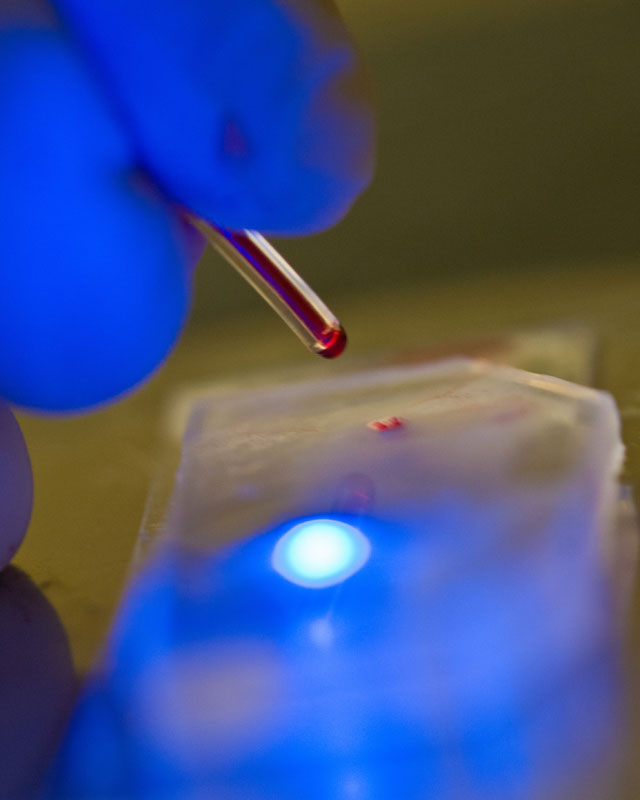Bioengineers who graduate from Lehigh University go on to work in established and emerging fields such as healthcare, biomedicine, pharmaceuticals, biomaterials and other biotechnology-related industries. They use engineering applications to address and solve challenges in the fields of biology and medicine and create usable, tangible products. Many develop and evaluate systems and devices that solve medical and health-related problems, such as artificial organs, prostheses, instrumentation, medical information systems and health management and care delivery systems.
Bioengineering allows students to combine engineering principles and the life sciences to explore opportunities and address challenges in the fields of healthcare, medicine and biotechnology.
 “I chose Lehigh because it was evident that the institution supported its students and their achievements. This was particularly important to me as I was looking to enter the STEM field and interested in research. I wanted to enter a profession that provides fulfillment in ways beyond monetary compensation alone. To me, the reward of helping others is invaluable.”
“I chose Lehigh because it was evident that the institution supported its students and their achievements. This was particularly important to me as I was looking to enter the STEM field and interested in research. I wanted to enter a profession that provides fulfillment in ways beyond monetary compensation alone. To me, the reward of helping others is invaluable.”
-Sara Oswald, Bioengineering B.S. student
Why Bioengineering?
What sets us apartLehigh’s highly interdisciplinary B.S. program in bioengineering trains students at the interface of engineering, the life and physical sciences, and healthcare. Bioengineering graduates take positions in healthcare, biomedicine, pharmaceuticals, biomaterials and other biotechnology industries. They solve challenges in biology and medicine while creating tangible products, including artificial organs, prostheses, instrumentation, medical information systems and healthcare management systems. The curriculum for a B.S. in Bioengineering bridges rigorous training in the engineering and physical sciences with biology and bioengineering applications. The basic science, mathematics and humanities core includes two courses in biology, and a course on bioethics. The bioengineering program complements formal instruction with opportunities for experiential learning via seminar courses, extended research with faculty members, and team-based and industry-sponsored design projects within Lehigh's Integrated Product Development program. Students also participate in summer internships, Research Experience for Undergraduates (REU) programs and Lehigh's co-op program. Lehigh's program also allows students to choose from three tracks for further specialization:*The below tracks are for the current BioE Sophomores, Juniors, and Seniors |
| Biopharmaceutical Engineering: | Bioelectronics/Biophotonics: | Biomechanics and Biomaterials: |
|---|---|---|
| This track encompasses biochemistry and chemical engineering. Topics include genomics, recombinant DNA, protein engineering, bioprocessing, drug synthesis and delivery. | This track appeals to students interested in the applications of electrical engineering and physics in bioengineering. Topics include signal processing, bioinstrumentation, biosensors, MEMs, biochips for DNA sequencing, and laser-and filter-based optical technology. | This track straddles molecular and cell biology, materials science, mechanical engineering and electrical engineering. It encompasses biomaterials and biomechanics, from cells and tissue to organs and systems. |
|
*The below tracks are for the current BioE first years and future students |
| Biopharmaceutical Engineering: | Biocomputational Engineering: | Biomechanics and Biomaterials: |
|---|---|---|
| This track encompasses biochemistry and chemical engineering. Topics include genomics, recombinant DNA, protein engineering, bioprocessing, drug synthesis and delivery. | Biocomputational engineers who graduate from Lehigh University will be prepared for professional opportunities at the interface of bioengineering and computational data sciences. With a background in this area, students will be in high demand at pharmaceutical, biotechnology and software companies. | This track straddles molecular and cell biology, materials science, mechanical engineering and electrical engineering. It encompasses biomaterials and biomechanics, from cells and tissue to organs and systems. |
Bioengineering Undergraduate Student Profiles |
|
|
|
|
|
|





